#Foster care misconceptions
Text
Common Misconceptions About Foster Care: Debunking the Myths
Common Misconceptions About Foster Care: Debunking the Myths. Foster care is a vital system that provides temporary homes for children who are unable to live with their biological families due to various reasons. Despite being a crucial system, foster care is frequently marred by misconceptions that contribute to misunderstandings and stigma. In this blog post, we’ll debunk some of the most…

View On WordPress
#Challenges in foster care system#Children in foster care#Children&039;s well-being in foster care#Compassionate society foster care#Debunking foster care myths#Dismantling foster care stigma#Empathy for foster parents#Foster care misconceptions#Foster care realities#Fostering informed and compassionate communities#Importance of family reunification#Support for foster families#Understanding foster care
0 notes
Text
“Clearly there are limits to the uses of skepticism. There is some cost-benefit analysis which must be applied, and if the comfort, consolation, and hope delivered by mysticism and superstition is high, and the dangers of belief comparatively low, should we not keep our misgivings to ourselves? But the issue is tricky… if we offer too much silent assent about mysticism and skepticism — even when it seems to be doing a little good — we abet a general climate in which skepticism is considered impolite, science tiresome, and rigorous thinking somehow stuffy and inappropriate.”
- Carl Sagan, The Demon-Haunted World: Science as a Candle in the Dark
#brot posts#astro posting#yes im still reading this book i kinda stopped for a few weeks so i could finish that one paper thing#but i finished it so im trying to finally finish this book now 😭#anyway this sums up my feelings soooo much#its why i care so much about posting corrections on misconceptions here on tumblr of all places#like yeah its tumblr but also i cannot in good conscience let you all walk away from an astronomy post with incorrect or inaccurate info#if i can do my small part to correct that and you walk away with a little bit more of a precise worldview then im satisfied#im doing my small part !#and its also why im so fucking irked by the relatively low stakes yet highly prevalent misconceptions about astronomy#like yah nothing is as high stakes as like. climate change denial for climatologists#or covid denial for medical professionals etc etc#but the whole. pluto shit or astrology like it all just fosters an overall culture of ignoring scientists and real science !!!#and i cannot abide by that !!#so im not a climate scientist nor do i know anything about medicine#so for those actual high stakes problems. i cannot step in and accomplish very much to combat this#but i DO know astronomy and so i will step in and try to do my part in this one small battle#in the larger war between science and pseudoscience
1 note
·
View note
Text
Abolition For Beginners (2023 Edition)
In honor of Tyre Nichols and all others we have lost to policing and imprisonment. In honor of Black History Month. In honor of Better Future Program's mission to educate and serve marginalized youth globally... Let's break down abolition, again. (As usual on Tumblr, tap for better quality.)
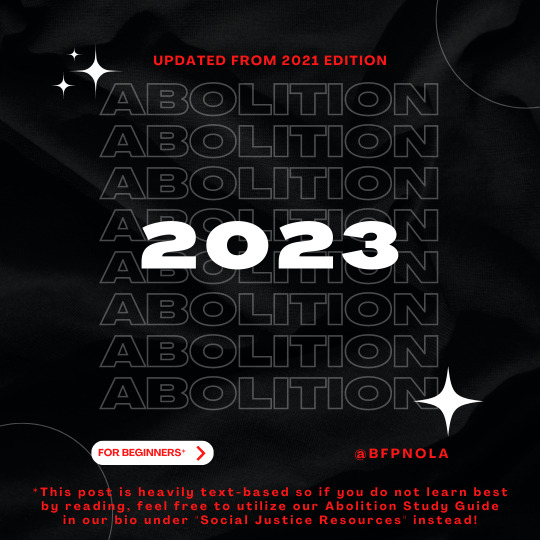
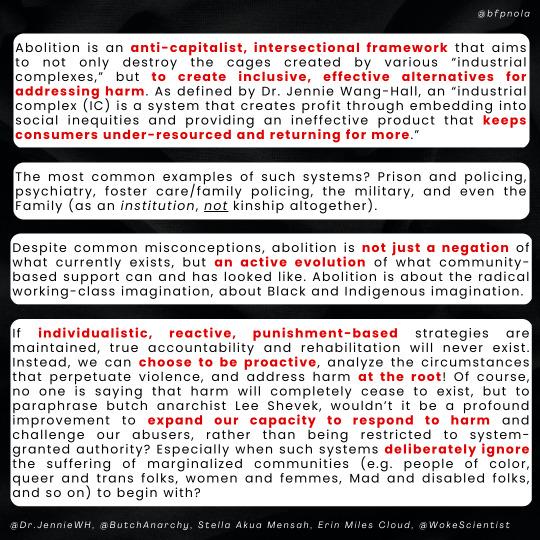

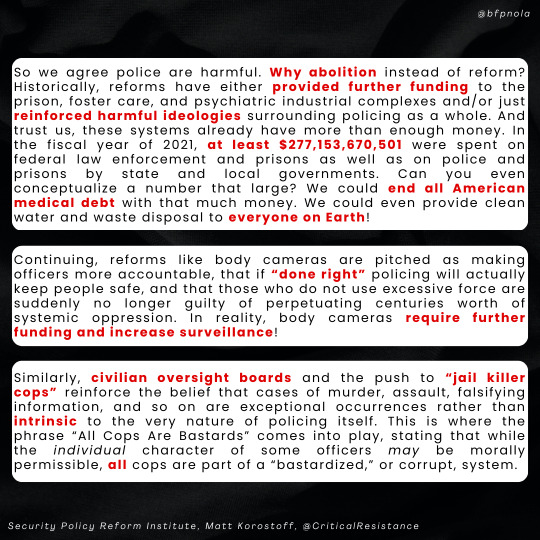
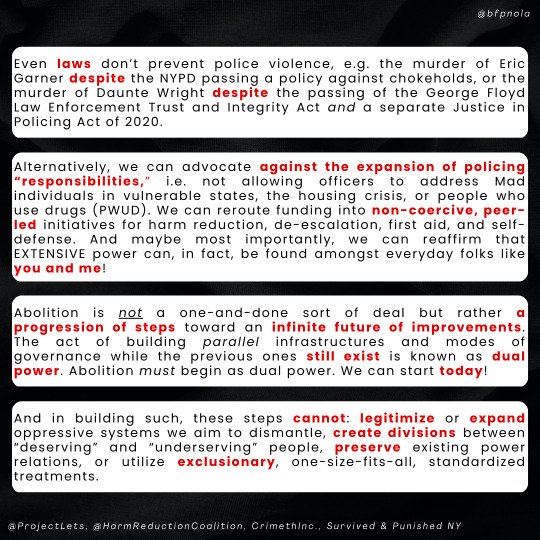
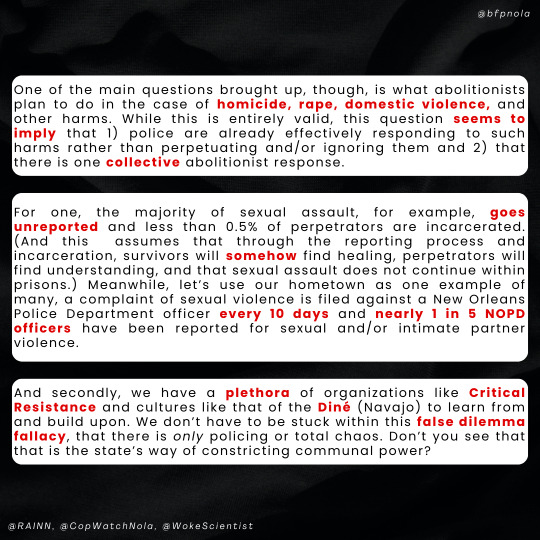

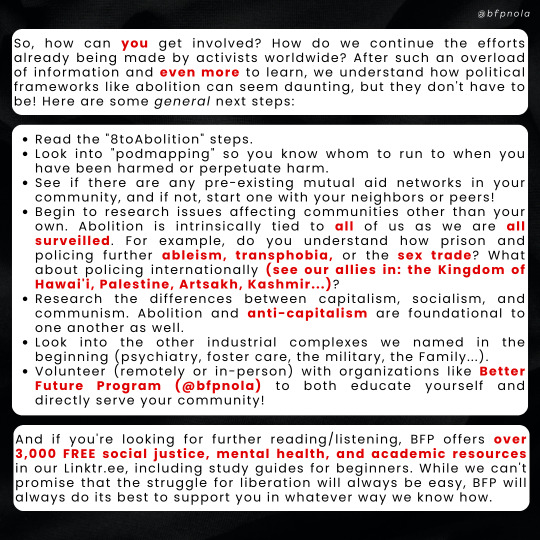
Better Future Program's Linktr.ee | Donate | Liberation Library | Open Leadership Positions | Staff Application | Discord Server
Image description below. Written by @reaux07. Proofread by the volunteers and supporters of @bfpnola.
Image Description:
[ID: All of the following slides use a wrinkled, black fabric as their background with black text (bolded red added for emphasis) on top of white boxes with rounded corners. “@bfpnola” is written in the top right corner and the sources for the slide are in the bottom left corner.
Title Slide (No. 1):
Written in red text, “UPDATED FROM 2021 EDITION.” The outlines of the word “ABOLITION” is written line by line 8 times in light grey with the year “2023” written on top in bold, white lettering. Below, written in red within a white bubble and red arrow, it reads “FOR BEGINNERS*.” Across from the bubble, “@BFPNOLA” is in red. Below, in red again, the asterisk mentioned before leads to the following note: “This post is heavily text-based so if you do not learn best by reading, feel free to utilize our Abolition Study Guide in our bio under "Social Justice Resources" instead!” Lastly, white stars and outlines of grey circles can be seen in each corner of the slide.
Slide No. 2 reads:
Abolition is an anti-capitalist, intersectional framework that aims to not only destroy the cages created by various “industrial complexes,” but to create inclusive, effective alternatives for addressing harm. As defined by Dr. Jennie Wang-Hall, an “industrial complex (IC) is a system that creates profit through embedding into social inequities and providing an ineffective product that keeps consumers under-resourced and returning for more.”
The most common examples of such systems? Prison and policing, psychiatry, foster care/family policing, the military, and even the Family (as an institution, not kinship altogether).
Despite common misconceptions, abolition is not just a negation of what currently exists, but an active evolution of what community-based support can and has looked like. Abolition is about the radical working-class imagination, about Black and Indigenous imagination.
If individualistic, reactive, punishment-based strategies are maintained, true accountability and rehabilitation will never exist. Instead, we can choose to be proactive, analyze the circumstances that perpetuate violence, and address harm at the root! Of course, no one is saying that harm will completely cease to exist, but to paraphrase butch anarchist Lee Shevek, wouldn’t it be a profound improvement to expand our capacity to respond to harm and challenge our abusers, rather than being restricted to system-granted authority? Especially when such systems deliberately ignore the suffering of marginalized communities (e.g. people of color, queer and trans folks, women and femmes, Mad and disabled folks, and so on) to begin with?
Sources: @Dr.JennieWH, @ButchAnarchy, Stella Akua Mensah, Erin Miles Cloud, @WokeScientist
Slide No. 3 reads:
Before we continue any further, let’s destroy the myth that cops actually stop violence. First off, we can’t depend on crime stats at face value because this begs the question of who exactly gets to define what counts as a “crime” and why (e.g. drug possession and sleeping in public vs. tax evasion of the wealthy and wage theft). Continuing, crime rates often only reflect violations that have actually been reported, chosen to be shown, and deemed out of line. By this logic, crime rates are simply reflections of cops’ perceptions, not of the material and emotional realities of the proletariat (i.e. the working-class).
As for perpetuating violence, “US law enforcement killed at least 1,183 people in 2022, making it the deadliest year on record for police violence.” (And those are just the deaths that were reported. In our home state of Louisiana, turns out the Jefferson Parish Sheriff’s Office, as of January 12, 2023, has been unlawfully destroying records of officer misconduct for at least 10 years.) Many (69%) of these murders were cases in which no offense was alleged, were mental health or welfare checks, or involved traffic violations and other nonviolent offenses.
This is, of course, without even touching on the involuntary servitude (i.e. enslavement) and maltreatment ongoing in American prisons. How many more deaths must occur before the general public says enough is enough? Or is this acceptable since these are working-class, disabled, Mad, non-white, queer, and trans lives being lost?
Sources: @InterruptCrim, The Guardian, Mapping Police Violence, @VeriteNewsNola
Slide No. 4 reads:
So we agree police are harmful. Why abolition instead of reform? Historically, reforms have either provided further funding to the prison, foster care, and psychiatric industrial complexes and/or just reinforced harmful ideologies surrounding policing as a whole. And trust us, these systems already have more than enough money. In the fiscal year of 2021, at least $277,153,670,501 were spent on federal law enforcement and prisons as well as on police and prisons by state and local governments. Can you even conceptualize a number that large? We could end all American medical debt with that much money. We could even provide clean water and waste disposal to everyone on Earth!
Continuing, reforms like body cameras are pitched as making officers more accountable, that if “done right” policing will actually keep people safe, and that those who do not use excessive force are suddenly no longer guilty of perpetuating centuries worth of systemic oppression. In reality, body cameras require further funding and increase surveillance!
Similarly, civilian oversight boards and the push to “jail killer cops” reinforce the belief that cases of murder, assault, falsifying information, and so on are exceptional occurrences rather than intrinsic to the very nature of policing itself. This is where the phrase “All Cops Are Bastards” comes into play, stating that while the individual character of some officers may be morally permissible, all cops are part of a “bastardized,” or corrupt, system.
Sources: Security Policy Reform Institute, Matt Korostoff, @CriticalResistance
Slide No. 5 reads:
Even laws don’t prevent police violence, e.g. the murder of Eric Garner despite the NYPD passing a policy against chokeholds, or the murder of Daunte Wright despite the passing of the George Floyd Law Enforcement Trust and Integrity Act and a separate Justice in Policing Act of 2020.
Alternatively, we can advocate against the expansion of policing “responsibilities,” i.e. not allowing officers to address Mad individuals in vulnerable states, the housing crisis, or people who use drugs (PWUD). We can reroute funding into non-coercive, peer-led initiatives for harm reduction, de-escalation, first aid, and self-defense. And maybe most importantly, we can reaffirm that EXTENSIVE power can, in fact, be found amongst everyday folks like you and me!
Abolition is not a one-and-done sort of deal but rather a progression of steps toward an infinite future of improvements. The act of building parallel infrastructures and modes of governance while the previous ones still exist is known as dual power. Abolition must begin as dual power. We can start today!
And in building such, these steps cannot: legitimize or expand oppressive systems we aim to dismantle, create divisions between “deserving” and “underserving” people, preserve existing power relations, or utilize exclusionary, one-size-fits-all, standardized treatments.
Sources: @ProjectLets, @HarmReductionCoalition, CrimethInc., Survived & Punished NY
Slide No. 6 reads:
One of the main questions brought up, though, is what abolitionists plan to do in the case of homicide, rape, domestic violence, and other harms. While this is entirely valid, this question seems to imply that 1) police are already effectively responding to such harms rather than perpetuating and/or ignoring them and 2) that there is one collective abolitionist response.
For one, the majority of sexual assault, for example, goes unreported and less than 0.5% of perpetrators are incarcerated. (And this assumes that through the reporting process and incarceration, survivors will somehow find healing, perpetrators will find understanding, and that sexual assault does not continue within prisons.) Meanwhile, let’s use our hometown as one example of many, a complaint of sexual violence is filed against a New Orleans Police Department officer every 10 days and nearly 1 in 5 NOPD officers have been reported for sexual and/or intimate partner violence.
And secondly, we have a plethora of organizations like Critical Resistance and cultures like that of the Diné (Navajo) to learn from and build upon. We don’t have to be stuck within this false dilemma fallacy, that there is only policing or total chaos. Don’t you see that that is the state’s way of constricting communal power?
Sources: @RAINN, @CopWatchNola, @WokeScientist
Slide No. 7 reads:
To expand this conversation, abolition heavily aligns with the political ideal of “anarchism.” Anarchism supports the absence of government and absolute freedom of the individual. And despite its negative connotations, anarchy also reflects an evolution of community-based care rather than just a deconstruction of what currently exists.
A simplified version of its 6 agreed-upon principles are:
Autonomy and Horizontality: define yourself on your own terms, we stand on an equal footing
Mutual Aid: bonds of solidarity form a stronger social glue than fear, support your community
Voluntary Association: associate or don't associate with whomever you wish
Direct Action: accomplish goals directly rather than depending on representatives or authorities
Revolution: overthrow those in power who enforce coercive hierarchies (ex. white supremacy)
Self-Liberation: you must be at the forefront of your own liberation, freedom must be taken
While being an abolitionist does not require alignment with anarchism, it is worth considering how the state plays such an enduring role in various social harms. Concurrently, whenever you treat other living beings with consideration and respect, come to reasonable compromise rather than coercion, and decide to share or delegate tasks, you are already living by anarchist principles.
Sources: Peter Gelderloos, David Graeber
Slide No. 8 reads:
So, how can you get involved? How do we continue the efforts already being made by activists worldwide? After such an overload of information and even more to learn, we understand how political frameworks like abolition can seem daunting, but they don't have to be! Here are some general next steps:
Read the "8toAbolition" steps.
Look into "podmapping" so you know whom to run to when you have been harmed or perpetuate harm.
See if there are any pre-existing mutual aid networks in your community, and if not, start one with your neighbors or peers!
Begin to research issues affecting communities other than your own. Abolition is intrinsically tied to all of us as we are all surveilled. For example, do you understand how prison and policing further ableism, transphobia, or the sex trade? What about policing internationally (see our allies in: the Kingdom of Hawai'i, Palestine, Artsakh, Kashmir...)?
Research the differences between capitalism, socialism, and communism. Abolition and anti-capitalism are foundational to one another as well.
Look into the other industrial complexes we named in the beginning (psychiatry, foster care, the military, the Family...).
Volunteer (remotely or in-person) with organizations like Better Future Program (@bfpnola) to both educate yourself and directly serve your community!
And if you're looking for further reading/listening, BFP offers over 3,000 FREE social justice, mental health, and academic resources in our Linktr.ee, including study guides for beginners. While we can't promise that the struggle for liberation will always be easy, BFP will always do its best to support you in whatever way we know how.
End ID.]
#reaux speaks#signal boost#tyre nichols#keenan anderson#cop city#abolition#abolish the police#defund the police#anti capitalism#intersectional feminism#palestine#black lives matter#blm#bipoc#disability justice#queer#trans#mass incarceration#study guide#mad liberation#psychiatry#family#military industrial complex#foster care#ACAB#tw rape mention#indigenous#anarchism#pinned post#BLACK HISTORY MONTH
731 notes
·
View notes
Text
5 Common Misconceptions of ABDLs!
To be clear, these are common misconceptions ABDLs have, not common misconceptions ABOUT us ABDLs!
1. "My kink is so rare!"
Really? Because candidly, abdl, ageplay, and diaper fetishism intersect in a fascinating way. There are diaper fetishists who despise any form of ageplay or regression, there are ageplayers who get off on the Ageplay, or the diapers, or the humiliation, teasing, or any other aspect of the kink. And candidly, you can tell ABDL really isn't that uncommon when the communities that show up are this large and varied. Heck, there's entire communities on reddit with tens of thousands of abdls, and that's just one site (and not the most kink friendly space to begin with.) Add in the fact that many people are very embarrassed or worried about this kink and you've got an even better explanation for why it can FEEL very rare or isolating... but it often comes down to just being hard to find, at first!
2. "Nobody vanilla will accept me! They must all think I'm a freak" (or similar negative expectation setting)
Except.. they do, all the time, every day. I've personally avoided most vanilla relationships, but I know MARRIED abdl couples who started with one partner totally vanilla, and some of the biggest and most successful content creators in this space are well known for having partners not into ABDL.
Simply put, if you assume it'll go wrong and you'll be judged, your body language, words, and tone can be much more nervous and defensive and make your partner feel ill at ease. Try to not go in with negative assumptions!
3. "I have to find a caregiver to feel little!"
Uh... no you don't. Your kink might involve a partner, your desires might include one or more people around to care for you or dominate you or join you in diapered submission... but none of that means you can't enjoy still, and have a GREAT time. You can try to foster your own regressive or littlespace mindset, happily. And you don't need ANYONE else to enable that. If you're expecting that just having sometime else around will fix things, you're sadly incorrect! You need, at some level, to be comfortable enough to not just rely on EXTERNAL enforcement of your abdl side!
4. "I should get rid of [x] because I feel embarrassed/bad/upset!" (Or any similar variant of the binge/ purge mentality)
Binge and purge cycles happen, and can be very emotionally destructive. Try to instead put the object in storage instead of throwing it out, because often your emotional negative response will only get worse when you later regret it or judge your own reaction.
Try to give yourself the space to struggle, but don't just throw things away or destroy them if they're kink items... instead, realize you might feel differently later and give yourself the grace to be allowed to change your mind without any further fear or judgment!
5. "Everybody can tell if I'm padded/ little/ going out discretely!"
No they can't. I could stop there but truly let's consider this: you realize that incontinence is common... shockingly common. You've passed people in adult diapers, pull ups, discrete pads, you've likely even been in a room with another heavily diapered adult and NEVER realized. Because unless you're being obvious, have leaks, or make a point to wear very form fitting clothing, nobody will notice or likely even look! You're much less exposed than your brain makes you think!!
My point is this: be nice to yourself, and work hard to challenge those negative self talk moments that come up for so many abdls. Your interests and desires aren't as rare as you think, more people are ok with it than you realize, nobody can usually tell even if you are padded (and would be more likely to assume it medical than kinky even if they noticed), and struggling with this is normal too!
BE NICER TO YOURSELF: THAT'S THIS PAPI'S ORDERS! You don't deserve to feel bad about something that helps you feel good!
And as always; stay happy, stay healthy, and stay kinky!
- Scribbler
#ab/dl babyboy#ab/dl lifestyle#ab/dl kink#mdlb relationship#cg/l relationship#giggle-byte#24/7 diapers#giggle byte#mdlb dynamic#md/lb
379 notes
·
View notes
Text
you know what's fucking me up? you know what's fucking me up tonight??
thinking how once astarion returns to mal after their big breakup, he gets such a wrong understanding of the situation it's fucking painful
he spends all those years, over half a decade, doing everything in his power to move on. and for a while it seems like it's working. he's distracted just enough for his mind to not slip back to those memories. to their final fights. to the hurt she caused. yet, every once in a while, astarion finds himself thinking of her. of her face and her voice, how warm and soft her lips were against his.
for a while he fights those cursed notions. he doesn't dare to let that weed spread its roots. but he finds himself missing her. thinking about her. wondering if she misses him too. and something in him shifts, as longing becomes hoping, the lost past becomes the possibility for the future. so he says "fuck it" and goes back to her. that fight was stupid and not worth it.
however, when he finally finds her, maleane greets him with a small child in her arms. her child. and it's like a stab straight through his heart.
he thinks that she's moved on. that she left their love in the past. that she gave up on him. started her own family. she's happy without him the way we couldn't be without her. and it's infuriating. it sharpens his tongue like a blade and he bites. he mocks her. he's hurt. and it blinds him.
he doesn't know that it almost broke her. that the years of solitude drove her to near-insanity. that she couldn't let go of what they had. that she was so utterly alone that in her mind it was the only way to survive, to not let the sadness consume her. to get herself a person that would never leave. a little piece of her that she could take care of.
and so, it's not a happy reunion. it's full of misconception and anger and bitterness. she thinks he's there to rub her "defeat" in her face. he thinks that he was foolish to hope she'd fostered any of the same feelings for him. all while still being in love with each other.
#the bg3 adventures#baldur's gate 3#astarion#astarion ancunin#astarion bg3#astarion x tav#tavstarion#oc: maleane#maleane/astarion#i'm passing out as I'm writing this#but.. on my mind.. many thoughts
26 notes
·
View notes
Text
Embracing Trans Rights: A Simple Guide to Understanding and Supporting Inclusivity
Introduction:
In recent years, conversations around trans rights have gained momentum, advocating for equal treatment and inclusivity for transgender individuals. Understanding and supporting trans rights is crucial for fostering a society that values diversity and respects the rights of all its members. In this article, we'll explore the basics of trans rights, why they matter, and how we can contribute to a more inclusive world.
Defining Trans Rights:
Trans rights refer to the fundamental human rights and freedoms that should be accorded to transgender individuals. These rights encompass various aspects of life, including legal recognition of gender identity, protection against discrimination, access to healthcare, and the right to live authentically without fear of prejudice.
Why Trans Rights Matter:
Transgender individuals, like everyone else, deserve to live their lives with dignity and respect. Trans rights are essential for creating an inclusive society where everyone has the opportunity to thrive and express their identity without facing discrimination. Advocating for trans rights is a step towards dismantling harmful stereotypes and fostering a more compassionate and understanding community.
Key Aspects of Trans Rights:
Legal Recognition: Transgender individuals should have the right to legal recognition of their gender identity. This includes the ability to change their gender marker on identification documents, ensuring that official records align with their affirmed gender.
Anti-Discrimination Protections: Trans people should be protected from discrimination in various aspects of life, including employment, education, healthcare, and public services. A society that values trans rights actively works to eliminate prejudice and bias.
Access to Healthcare: Quality healthcare should be accessible to everyone, including transgender individuals. This includes gender-affirming care, mental health support, and other healthcare services that cater to the unique needs of the transgender community.
Safe Public Spaces: Trans individuals deserve to feel safe in public spaces. Advocating for trans rights involves promoting policies and attitudes that ensure inclusive and safe environments for everyone, regardless of gender identity.
Supporting Trans Rights:
Supporting trans rights is a collective effort that begins with education and understanding. Here are a few simple ways to contribute:
Educate Yourself: Take the time to learn about transgender experiences, challenges, and the importance of trans rights. Understanding fosters empathy and helps dispel myths and misconceptions.
Be an Ally: Stand up against transphobia when you encounter it. Being an ally means supporting and advocating for the rights of transgender individuals, even if you are not personally affected.
Use Inclusive Language: Be mindful of the language you use and strive to be inclusive. Respecting people's chosen names and pronouns contributes to creating a more welcoming environment.
Support Inclusive Policies: Advocate for policies that protect trans rights in your community, workplace, and beyond. Support organizations working towards inclusivity and equality.
Conclusion:
In embracing trans rights, we contribute to building a world where everyone is valued, respected, and free to live authentically. By understanding the basics and actively supporting the rights of transgender individuals, we take a meaningful step towards creating a society that celebrates diversity and ensures equal rights for all.
#trans rights#transgender#transformers#transfem#transgirl#trans joy#transformation#spilled ink#dimension 20
27 notes
·
View notes
Note
Hello lovely,
What are the pros and cons of pursuing a diagnosis?
I think I have autism (32 on the AQ, 139 on the CAT-Q, 157 on the RAADS-R, and 133 on the Aspie Quiz v5) but I'm a very high-masking gifted/honors/AP girl and I worry it will have more cons bc of poor societal acceptance then it will have pros : (
I mentioned my concerns to my primary care doctor and she really quickly dismissed them (I didn't mention the tests I did, just that I had a lot of traits/issues typical of autism) and I'm worried that trying to get help or anything will be a long hard uphill battle. Fortunately I am getting seen for sleep issues soon which are my worst problem but yeah
Thanks for your counsel
- 💙🌹
Hi there,
There are many pros and cons when it comes to getting an autism diagnosis. Here’s some from helpfulminds.co.uk
Advantages of Adult Autism Diagnosis:
1. Self-understanding and identity: Receiving an autism diagnosis as an adult can provide a profound sense of self-understanding. It validates personal experiences and challenges, helping individuals make sense of their differences. It offers a framework through which they can explore their unique strengths, interests, and areas of difficulty, leading to greater self-acceptance and personal growth.
2. Access to appropriate support and accommodations: An adult autism diagnosis opens doors to various resources and support services. It enables individuals to access specialised therapies, counselling, and tailored interventions. It may also qualify them for workplace accommodations, such as flexible schedules, task modifications, or a supportive work environment. These support systems can enhance well-being, foster independence, and improve overall quality of life.
3. Connection and community: Obtaining an autism diagnosis can provide a pathway to connecting with others who share similar experiences. Joining support groups, online communities or participating in autism advocacy networks can foster a sense of belonging and reduce feelings of isolation. These connections often offer invaluable emotional support, shared experiences, and practical advice.
4. Enhanced relationships and communication: Understanding one’s autistic traits can lead to improved personal and professional relationships. It helps individuals communicate their needs and preferences effectively, reducing misunderstandings and promoting better understanding among friends, family members, and colleagues. With increased self-awareness, individuals can build stronger connections and cultivate healthier interactions.
Disadvantages of Adult Autism Diagnosis:
1. Emotional impact: Receiving an autism diagnosis as an adult can trigger a range of emotions, including relief, validation, but also grief or regret. Some individuals may experience a sense of loss for the opportunities they feel they missed or the difficulties they faced due to a lack of understanding. The process can be emotionally challenging and require support to navigate.
2. Stigma and societal perceptions: Unfortunately, despite growing awareness, Autism is still surrounded by stigma and misconceptions. Disclosure of an adult autism diagnosis can lead to potential discrimination, prejudice, or social exclusion. Society’s limited understanding of Autism may hinder employment, education, or social integration opportunities. This lack of acceptance emphasises the need for broader awareness and education.
3. Limited diagnostic resources and accessibility: Obtaining an autism diagnosis as an adult can be challenging due to limited diagnostic resources and professionals specialising in adult assessments. Waiting times and financial constraints may present significant barriers for those seeking a diagnosis. This lack of accessibility may lead to delayed self-understanding and hinder access to vital support services.
Seeking an autism diagnosis as an adult has advantages and disadvantages. While the diagnosis can offer self-understanding, access to support, and a sense of community, it may also evoke complex emotions and expose individuals to societal stigma. It is important to weigh these factors and consider personal circumstances before pursuing a diagnosis. Regardless of whether one receives an official diagnosis, fostering acceptance and embracing neurodiversity can contribute to a more inclusive and understanding society.
The full article will be below. There are even more pros and cons, so those are just examples. I recommend researching for more to make up your mind.
I hope this helps. Thank you for the inbox. I hope you have a wonderful day/night. ♥️
48 notes
·
View notes
Text


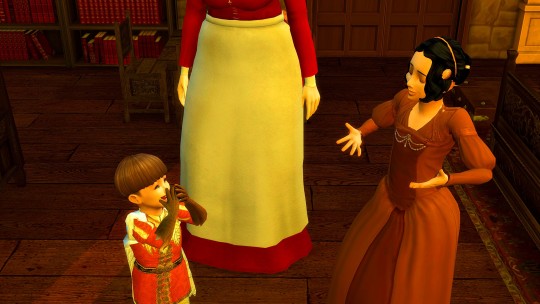


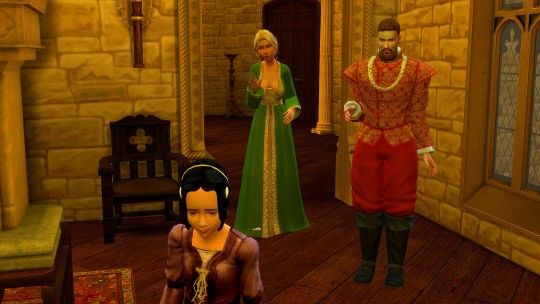

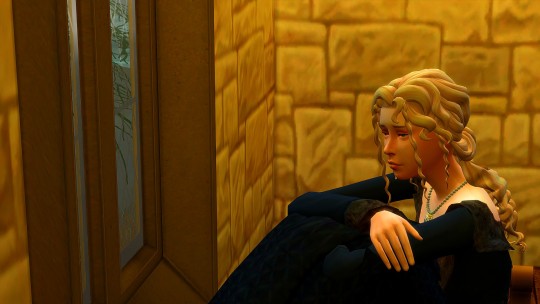
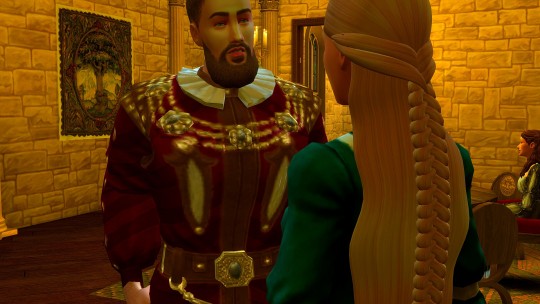





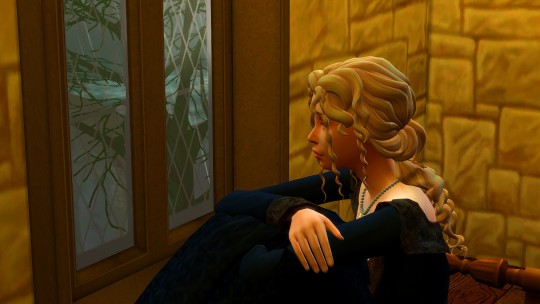

In the months following King Thomas's passing, the grand halls of Windenburg Castle were cloaked in somber shadows as the relentless rain poured outside. The absence of her beloved father weighed heavily on Queen Cordelia, casting a deep pall over her life. To make matters more challenging, her relationship with her husband, Wilhelm, had transformed into an unbearable ordeal. His character had undergone a drastic metamorphosis, as he now sought to wield more control over Cordelia, something he had never dared to do in her father's presence. Their incessant quarrels and their attempts to avoid one another turned the castle into a prison for Cordelia, stifling her every breath.
As Cordelia gazed out at the stormy sea from her window, she couldn't help but reflect on her initial misconceptions about Wilhelm. She had never truly comprehended the depths of his character, naively believing that he might change for the better with time. However, the passing years had shattered her illusions, revealing a man she could hardly recognize.
The passing of Queen Fiona, Augusta's mother, marked the beginning of a dreadful chapter. Without delay, Wilhelm ruthlessly stripped his daughter of her privileges. Augusta's ladies were commanded to empty her chambers, discarding many of her most cherished possessions. For Augusta, a mere three-year-old at the time, the sudden upheaval was a source of deep confusion and heartache. She couldn't fathom why the nurturing women who had always been by her side were abruptly absent. This heartbreak only compounded the emotional turmoil she was already enduring at the hands of her own father.
Cordelia's discovery of Wilhelm's ruthless actions towards his own flesh and blood filled her with an indignant fury. In the period preceding their marriage in 1336, she confronted Wilhelm with a steely resolve. She adamantly refused to proceed with the wedding unless he showed mercy to Augusta, allowing her to remain at the castle. Wilhelm begrudgingly conceded to her demand but remained steadfast in his refusal to reinstate Augusta's titles.
The years that followed were marked by growing doubts in Cordelia's heart. Wilhelm's cruelty towards Augusta showed no sign of abating. Every time he laid eyes on his daughter, he felt the need to continually remind her of his disdain and disappointment. His unrelenting insistence that Augusta might be a bastard due to her mother's alleged history was a cruel and merciless assault on the young girl's fragile emotions.
In contrast, Cordelia assumed the role of a mother figure for Augusta, demonstrating kindness and compassion from the very beginning. She worked diligently to build a deeper and more meaningful relationship with the girl than she had ever shared with her own father. When Cordelia's son was born, Augusta readily embraced her role as the young prince's older sister, fostering a bond of affection and protection.
Now, in the year 1341, Queen Cordelia's connection with her son and stepdaughter had grown remarkably strong. Unlike other queens, she adopted a hands-on approach, insisting on spending quality time with the children daily. Her collaboration with Lady Rotchford in caring for the children further solidified her unique position as a devoted and loving mother.
As Queen Cordelia continued to gaze out at the tempestuous sea from her window, a profound sense of sorrow welled up within her. The perpetual turmoil in her marriage weighed heavily on her heart. While her love for her family remained a guiding light, it was impossible for her not to question whether a resolution to their family's turmoil would ever be attainable.
#simsmedieval#sims4#windenburg#royalsims#royal#sims#thesimsmedieval#gameofthrones#royalty#simsstory#my sims#historical sims#royalty sims#sim legacy#sims 4#simblr#sims 4 gameplay#sims 4 cc#sims 4 screenshots#thesims4#thesims4cc#the sims 4#historicalsims#history#legacy challenge#ts4 legacy#sims 4 legacy#ts4 decades challenge#ultimate decades challenge#decades legacy
39 notes
·
View notes
Note
I’m actually kind of surprised BlitzFizz isn’t more popular? Like even a lot of SH crew members ship it and post headcanons and art about it. But the fandom doesn’t gel with it, but I’m not sure why, other than the misconception that they’re related. They have canon partners sure, but that hasn’t stopped people in other fandoms. And poly’s an option (and a lot of non-Viv crew members are/ship poly too!)
Let’s give it time, right now it’s all about stolas this stolas that. And so is literally all of the marketing. Even the Oops episode was chained by the neck to fizzozzie and stolitz so they’ve had almost no private time, just being together. Even as kids it cuts to cash dragging blitz to stolas, and their conversation as teenagers was cut short for the Ozzie scene. Some people didn’t even see the letter blitz was holding because his feelings haven’t been explored but I think they’ve always been there in the show we just haven’t seen it. Cough truth seekers symbolism in both moxxie and Blitzs hallucination, cough. I’m just saying I think Brandon and Viv were planning this for a loong time. And if my theory about Millie and moxxie is true the reveal is going to be a massive gut punch.
But it’s not that they don’t gel with it at all. In the past two episodes on YouTube I saw a lot of lovely comments, “fizz really brings out the best in blitzø” “nobody can protect fizz the way Blitzø can” “i feel like only fizz can see through Blitzs nonsense” “look at how honest blitz is when he’s with fizz”
As a wise man once said, “It’s all about that journey”
I’m sure it’ll begin to shift soon. Also, I’m convinced people only call them related (now at least) so that fizz doesn’t become a stolitz roadblock. It’s to make people shut up.
But for hell sake even back then, who would say this about a sibling ????
The same people who cry about us lacking media literacy apparently weren’t paying attention to the blatant dialogue. He even called the robot slutty.
Growing up in the same place doesn’t make them siblings that is just…so dumb. Like I can really tell none of these people grew up in the system or experienced the system or know about how foster care works.
Do they also think this brat is Loonas brother ?

Side note I hope we get a full episode of Loona during this time, entirely from her perspective. With blitz only coming in right at the last minute ruining her escape plans whatever they were. Bonus if no men speak. Lol. Just Loona seeing puppies sharing her cell come and go, the mean boss lady, her breaking out to party, her fixating on Verosikas music to help fuel her imagining an escape.
Like imagine if there was a small pup girl who looked like her, who she became really attached to and protected, and she had to see her be adopted. The girl being sad for Loona and a bit scared but Loona assuring her everything will be fine? A scene like that would make me cry genuinely because it happens in the system all the time.
26 notes
·
View notes
Text
Minds, Not Just Chains
In my role as a dominant, I find undeniable gratification in arousing a submissive's physical desires. However, beyond mere physicality, my ultimate aspiration lies in delving into profound and intense explorations of their intellect. Leading them on a journey of soulful growth is where I derive the most satisfaction and fulfillment. Today let’s delve into the complexities of dominance beyond the realm of physical arousal, exploring the profound connections and intellectual stimulation that define my role as a dominant.
As a dominant, I relish the opportunity to engage with a submissive on a deeper intellectual level. Beyond the physical acts of
dominance, I am drawn to the challenge of stimulating their mind and provoking thought-provoking conversations. Engaging in discussions about desires, fantasies, and boundaries allows for a deeper understanding of each other's psyche and fosters a sense of connection that transcends the physical realm. By exploring their intellect, I aim to cultivate a dynamic of mutual respect, trust, and intellectual stimulation that enriches both our experiences within the D/s dynamic. This intellectual engagement serves not only to enhance our connection but also to empower the submissive to explore their thoughts and desires more deeply.
For me, the essence of dominance extends beyond mere control or physical pleasure; it encompasses guiding a submissive on a journey of soulful growth and self-discovery. Through careful guidance, encouragement, and support, I strive to create an environment that fosters personal development and empowerment. By challenging them to lead their best life, encouraging self-reflection, and providing a safe space for exploration, I aim to facilitate transformative experiences that contribute to their emotional and spiritual growth. Ultimately, my goal as a dominant is to empower my submissive to embrace their authentic self and realize their full potential. This journey of soulful growth requires patience, understanding, and a deep commitment to the well-being and development of the submissive.
While the pursuit of intellectual and soulful growth within a D/S dynamic is deeply rewarding, it also presents its own set of challenges and complexities. Navigating power dynamics, addressing emotional vulnerabilities, and maintaining open communication are essential components of fostering a healthy and fulfilling lifestyle relationship. Additionally, societal stigma and misconceptions surrounding BDSM can pose obstacles to embracing this aspect of identity and expression fully. However, by approaching these challenges with honesty, empathy, and a willingness to learn and grow, both the dominant and the submissive can navigate them together, strengthening their connection and deepening their bond.
As a dominant, my gratification extends far beyond the physical realm. While arousing a submissive's physical desires is undeniably satisfying, my ultimate aspiration lies in delving into profound intellectual explorations and leading them on a journey of soulful growth. By engaging with their intellect and guiding them toward personal empowerment and self-discovery, I strive to create meaningful and transformative experiences within the dynamic. Embracing the complexities of dominance and the multifaceted nature of human connection allows me to fulfill my role as a dominant in a way that transcends mere physicality, enriching both my experiences and those of my submissive.
If you enjoyed this, I invite you to give my podcast a listen 'Chatting With The Lightkeeper,' a top 25% most-followed podcasts on Spotify but available on all the major podcasting apps and follow my socials for more exclusive content: Instagram, Facebook, Bluesky, and X (formerly Twitter) for a deeper dive into the wonderful world of D/S.
As with all of my thoughts, please see this disclaimer.
©TLK2024
#bd/sm blog#bd/sm community#bd/sm daddy#bd/sm kink#bd/sm lifestyle#bd/sm relationship#d/s#d/s community#d/s relationship#dom/sub#my writing
8 notes
·
View notes
Text
Breaking the Stereotypes
Introduction
Breaking the Stereotypes: Unveiling the Realities of Foster Care. Foster care is a vital system that plays a crucial role in providing temporary homes for children who cannot remain with their biological families. Unfortunately, foster care often falls victim to misconceptions and stereotypes that overshadow the positive impact it can have on children’s lives. In this blog post, we…

View On WordPress
#Foster care advocacy#Foster care awareness#Foster care challenges#Foster care experiences#Foster care facts#Foster care misconceptions#Foster care realities Foster care myths Foster care system#Foster care support#foster children#Foster parenting
0 notes
Text
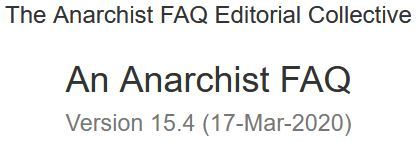
I.1 Isn’t libertarian socialism an oxymoron?
In a word, no. This question is often asked by those who have come across the so-called “libertarian” right. As discussed in section A.1.3, the word “libertarian” has been used by anarchists for far longer than the pro-free market right have been using it. In fact, anarchists have been using it as a synonym for anarchist for over 150 years, since 1858. In comparison, widespread use of the term by the so-called “libertarian” right dates from the 1970s in America (with, from the 1940s onwards, limited use by a few individuals). Indeed, outside of North America “libertarian” is still essentially used as an equivalent of “anarchist” and as a shortened version of “libertarian socialist.” As Noam Chomsky notes:
“Let me just say regarding the terminology, since we happen to be in the United States, we have to be rather careful. Libertarian in the United States has a meaning which is almost the opposite of what it has in the rest of the world traditionally. Here, libertarian means ultra right-wing capitalist. In the European tradition, libertarian meant socialist. So, anarchism was sometimes called libertarian socialism, a large wing of anarchism, so we have to be a little careful about terminology.” [Reluctant Icon]
This in itself does not prove that the term “libertarian socialist” is free of contradiction. However, as we will show below, the claim that the term is self-contradictory rests on the assumption that socialism requires the state in order to exist and that socialism is incompatible with liberty (and the equally fallacious claim that capitalism is libertarian and does not need the state). This assumption, as is often true of many objections to socialism, is based on a misconception of what socialism is, a misconception that many authoritarian socialists and the state capitalism of Soviet Russia have helped to foster. In reality it is the term “state socialism” which is the true oxymoron.
Sadly many people take for granted the assertion of many on the right and left that socialism equals Leninism or Marxism and ignore the rich and diverse history of socialist ideas, ideas that spread from communist and individualist-anarchism to Leninism. As Benjamin Tucker once noted, “the fact that State Socialism … has overshadowed other forms of Socialism gives it no right to a monopoly of the Socialistic idea.” [Instead of a Book, pp. 363–4] Unfortunately, many on the left combine with the right to do exactly that. Indeed, the right (and, of course, many on the left) consider that, by definition, “socialism” is state ownership and control of the means of production, along with centrally planned determination of the national economy (and so social life).
Yet even a quick glance at the history of the socialist movement indicates that the identification of socialism with state ownership and control is not common. For example, Anarchists, many Guild Socialists, council communists (and other libertarian Marxists), as well as followers of Robert Owen, all rejected state ownership. Indeed, anarchists recognised that the means of production did not change their form as capital when the state took over their ownership nor did wage-labour change its nature when it is the state employing labour (for example, see section H.3.13). For anarchists state ownership of capital is not socialistic in the slightest. Indeed, as Tucker was well aware, state ownership turned everyone into a proletarian (bar the state bureaucracy) — hardly a desirable thing for a political theory aiming for the end of wage slavery!
So what does socialism mean? Is it compatible with libertarian ideals? What do the words “libertarian” and “socialism” actually mean? It is temping to use dictionary definitions as a starting point, although we should stress that such a method holds problems as different dictionaries have different definitions and the fact that dictionaries are rarely politically sophisticated. Use one definition, and someone else will counter with one more to their liking. For example, “socialism” is often defined as “state ownership of wealth” and “anarchy” as “disorder.” Neither of these definitions are useful when discussing political ideas, particularly anarchism as, obviously, no form of anarchism would be socialist by such a definition nor do anarchists seek disorder. Therefore, the use of dictionaries is not the end of a discussion and often misleading when applied to politics.
Libertarian, though, is generally defined to mean someone who upholds the principles of liberty, especially individual liberty of thought and action. Such a situation cannot but be encouraged by socialism, by free access to the means of life. This is because in such a situation people associate as equals and so. as John Most and Emma Goldman once argued, the “system of communism logically excludes any and every relation between master and servant, and means really Anarchism.” [“Talking about Anarchy”, p. 28, Black Flag, no. 228, p. 28] In other words, by basing itself on free association and self-management in every aspect of life the anarchist form of socialism cannot but be libertarian.
In other words, there is a reason why anarchists have used the term libertarian for over 150 years! More to the point, why assume that the right’s recent appropriation of the word be considered the base point? That implies that private property defends individual liberty rather than suppresses it. Such an assumption, as anarchists have argued from the start of anarchism as a distinct socio-political theory, is wrong. As we discussed earlier (see section B.4, for example), capitalism denies liberty of thought and action within the workplace (unless one is the boss, of course). As one staunch defender of capitalism (and a classical liberal often listed as a forefather of right-wing “libertarianism”) glibly noted, the capitalist “of course exercises power over the workers”, although “he cannot exercise it arbitrarily” thanks to the market but within this limit “the entrepreneur is free to give full rein to his whims” and “to dismiss workers offhand” [Ludwig von Mises, Socialism, p. 443 and p. 444] Right-wing “libertarians” are utterly blind to the liberty-destroying hierarchies associated with private property, perhaps unsurprisingly as they are fundamentally pro-capitalist and anti-socialist (equally unsurprisingly, genuine libertarians tend to call them “propertarians”). As left-wing economist Geoffrey M. Hodgson correctly notes:
“By their own logic, [such] market individualists are forced to disregard the organisational structure of the firm, or to falsely imagine that markets exist inside it. To do otherwise would be to admit that a system as dynamic as capitalism depends upon a mode of organisation from which markets are excluded … This … allows market individualists to ignore the reality of non-market organisations in the private sector … They can thus ignore the reality of control and authority within the private capitalist corporation but remain critical of public sector bureaucracy and state planning.” [Economics and Utopia, pp. 85–6]
The propertarian perspective inevitably generates massive contradictions, such as admitting that both the state and private property share a common monopoly of decision making over a given area yet opposing only the former (see section F.1). As anarchists have long pointed out, the hierarchical social relations associated with private property have nothing to do with individual liberty. Removing the state but keeping private property would, therefore, not be a step forward: “A fine business we would make if we destroyed the State and replaced it with a mass of little States! killing a monster with one head and keeping a monster with a thousand heads!” [Carlo Cafiero, “Anarchy and Communism”, pp. 179–86, The Raven, No. 6, p. 181]
This is why we argue that anarchism is more than just a stateless society, for while a society without a state is a necessary condition for anarchy it is not sufficient — private hierarchies also limit freedom. Hence Chomsky:
“It’s all generally based on the idea that hierarchic and authoritarian structures are not self-justifying. They have to have a justification . .. For example, your workplace is one point of contact and association. So, workplaces ought to be democratically controlled by participants .. . there are all kinds of ways in which people interact with one another. The forms of organisation and association that grow out of those should be, to the extent possible, non-authoritarian, non-hierarchic, managed and directed by the participants.” [Reluctant Icon]
Therefore, anarchists argue, real libertarian ideas must be based on workers self-management, i.e. workers must control and manage the work they do, determining where and how they do it and what happens to the fruit of their labour, which in turn means the elimination of wage labour. Or, to use Proudhon’s words, the “abolition of the proletariat.” [Selected Writings of Pierre-Joseph Proudhon, p. 179] Unless this is done then the majority of people will become subject to the authoritarian social relationships the likes of Mises and other right-wing “libertarians” support. As one communist-anarchist put it:
“It is because the individual does not own himself, and is not permitted to be his true self. He has become a mere market commodity, an instrument for the accumulation of property — for others … Individuality is stretched on the Procrustes bed of business … If our individuality were to be made the price of breathing, what ado there would be about the violence done to the personality! And yet our very right to food, drink and shelter is only too often conditioned upon our loss of individuality. These things are granted to the propertyless millions (and how scantily!) only in exchange for their individuality — they become the mere instruments of industry.” [Max Baginski, “Stirner: The Ego and His Own”, pp. 142–151, Mother Earth, Vol. II, No. 3, p. 150]
Socialism, anarchists argue, can only mean a classless and anti-authoritarian (i.e. libertarian) society in which people manage their own affairs, either as individuals or as part of a group (depending on the situation). In other words, it implies self-management in all aspects of life — including work. It has always struck anarchists as somewhat strange and paradoxical (to say the least) that a system of “natural” liberty (Adam Smith’s term, misappropriated by supporters of capitalism) involves the vast majority having to sell that liberty in order to survive. Thus to be consistently libertarian is, logically, to advocate self-management, and so socialism (see section G.4.2). This explains the long standing anarchist opposition to the phoney “individualism” associated with classical liberalism (so-called right-wing “libertarian” ideology, although better termed “propertarian” to avoid confusion). Thus we find Emma Goldman dismissing “this kind of individualism” in “whose name . .. social oppression are defended and held up as virtues.” [Red Emma Speaks, p. 112]
As we will discuss in section I.3.3, socialisation is advocated to ensure the elimination of wage labour and is a common theme of all genuine forms of socialism. In theory at least, anarchist argue that state socialism does not eliminate wage labour, rather it universalises it. In fact, state socialism shows that socialism is necessarily libertarian, not statist. For if the state owns the workplace, then the producers do not, and so they will not be at liberty to manage their own work but will instead be subject to the state as the boss. Moreover, replacing the capitalist owning class by state officials in no way eliminates wage labour; in fact it makes it worse in many cases. Therefore “socialists” who argue for nationalisation of the means of production are not socialists (which means that the Soviet Union and the other so-called “socialist” countries are not socialist nor are parties which advocate nationalisation socialist).
Indeed, attempts to associate socialism with the state misunderstands the nature of socialism. It is an essential principle of socialism that (social) inequalities between individuals must be abolished to ensure liberty for all (natural inequalities cannot be abolished, nor do anarchists desire to do so). Socialism, as Proudhon put it, “is egalitarian above all else.” [No Gods, No Masters, vol. 1, p. 57] This applies to inequalities of power as well, especially to political power. And any hierarchical system (particularly the state) is marked by inequalities of power — those at the top (elected or not) have more power than those at the bottom. Hence the following comments provoked by the expulsion of anarchists from the social democratic Second International:
“It could be argued with much more reason that we are the most logical and most complete socialists, since we demand for every person not just his [or her] entire measure of the wealth of society but also his [or her] portion of social power, which is to say, the real ability to make his [or her] influence felt, along with that of everybody else, in the administration of public affairs.” [Malatesta and Hamon, Op. Cit., vol. 2, p. 20]
The election of someone to administer public affairs for you is not having a portion of social power. It is, to use of words of Emile Pouget (a leading French anarcho-syndicalist) “an act of abdication,” the delegating of power into the hands of a few. [Op. Cit., p. 67] This means that ”[a]ll political power inevitably creates a privileged situation for the men who exercise it. Thus it violates, from the beginning, the equalitarian principle.” [Voline, The Unknown Revolution, p. 249]
From this short discussion we see the links between libertarian and socialism. To be a true libertarian requires you to support workers’ control otherwise you support authoritarian social relationships. To support workers’ control, by necessity, means that you must ensure that the producers own (and so control) the means of producing and distributing the goods they create. Without ownership, they cannot truly control their own activity or the product of their labour. The situation where workers possess the means of producing and distributing goods is socialism. Thus to be a true libertarian requires you to be a socialist.
Similarly, a true socialist must also support individual liberty of thought and action, otherwise the producers “possess” the means of production and distribution in name only. If the state owns the means of life, then the producers do not and so are in no position to manage their own activity. As the experience of Russia under Lenin shows, state ownership soon produces state control and the creation of a bureaucratic class which exploits and oppresses the workers even more so than their old bosses. Since it is an essential principle of socialism that inequalities between people must be abolished in order to ensure liberty, it makes no sense for a genuine socialist to support any institution based on inequalities of power (and as we discussed in section B.2, the state is just such an institution). To oppose inequality and not extend that opposition to inequalities in power, especially political power, suggests a lack of clear thinking. Thus to be a true socialist requires you to be a libertarian, to be for individual liberty and opposed to inequalities of power which restrict that liberty.
Therefore, rather than being an oxymoron, “libertarian socialism” indicates that true socialism must be libertarian and that a libertarian who is not a socialist is a phoney. As true socialists oppose wage labour, they must also oppose the state for the same reasons. Similarly, consistent libertarians must oppose wage labour for the same reasons they must oppose the state. So, libertarian socialism rejects the idea of state ownership and control of the economy, along with the state as such. Through workers’ self-management it proposes to bring an end to authority, exploitation, and hierarchy in production. This in itself will increase, not reduce, liberty. Those who argue otherwise rarely claim that political democracy results in less freedom than political dictatorship.
One last point. It could be argued that many social anarchists smuggle the state back in via communal ownership of the means of life. This, however, is not the case. To argue so confuses society with the state. The communal ownership advocated by collectivist and communist anarchists is not the same as state ownership. This is because it is based on horizontal relationships between the actual workers and the “owners” of social capital (i.e. the federated communities as a whole, which includes the workers themselves we must stress), not vertical ones as in nationalisation (which are between state bureaucracies and its “citizens”). Also, such communal ownership is based upon letting workers manage their own work and workplaces. This means that it is based upon, and does not replace, workers’ self-management. In addition, all the members of an anarchist community fall into one of three categories:
(1) producers (i.e. members of a collective or self-employed artisans); (2) those unable to work (i.e. the old, sick and so on, who were producers); or (3) the young (i.e. those who will be producers).
Therefore, workers’ self-management within a framework of communal ownership is entirely compatible with libertarian and socialist ideas concerning the possession of the means of producing and distributing goods by the producers themselves. Far from there being any contradiction between libertarianism and socialism, libertarian ideals imply socialist ones, and vice versa. As Bakunin put it in 1867:
“We are convinced that freedom without Socialism is privilege and injustice, and that Socialism without freedom is slavery and brutality.” [Bakunin on Anarchism, p. 127]
History has proven him correct. Rather that libertarian socialism being the oxymoron, it is state socialism and libertarian capitalism that are. Both historically (in terms of who first used the word) and logically (in terms of opposing all hierarchical organisations) it is anarchists who should be called libertarians, not the propertarian right.
#anarchist society#practical#practical anarchism#practical anarchy#faq#anarchy faq#revolution#anarchism#daily posts#communism#anti capitalist#anti capitalism#late stage capitalism#organization#grassroots#grass roots#anarchists#libraries#leftism#social issues#economy#economics#climate change#climate crisis#climate#ecology#anarchy works#environmentalism#environment#solarpunk
16 notes
·
View notes
Text

From @thekirbycrew_ on Instagram: My family wouldn’t be complete without our pets. We rescued our dog and four cats, and they are true members of the family. They bring us so much joy! Three of our cats are siblings and were actually found in a tool shed almost immediately after birth. Since they had no mother, the kittens needed extra attention to be fed and monitored for proper growth and health. We are thankful for the pet fosters who temporarily cared for our babies until they were old enough and ready to come to our loving home.
It’s a common misconception that fostering has to be long term, but that isn’t true! A pet may need care for just a few days and nights. Caring for a pet short term can take a few different forms. Sometimes a friend, neighbor, or family member may not be able to care for their pet due to being out of town, being sick/in the hospital, or from falling on economic hard times. You could temporarily take the pet into your home and give them a safe place full of love and care. You also give your friend/neighbor peace of mind so they can focus on getting better. Providing care for pets within your community helps keep pets out of shelters and united with their families.
Caring for pets is not only good for them, it’s good for you too! According to a poll from the American Psychiatric Association, 86% of pet owners said their pets have a positive impact on their mental health. Is there someone in your community who could benefit from you temporarily fostering their pet? #BeAHelper and take direct action to help keep pets with their families. Head over to PetsAndPeopleTogether.org to find out more!
11 notes
·
View notes
Text
Marines &the world government uneasy relations
Salute recruits and soldiers on this trembling Thursday 🌊⚓🌊⚓🌊⚓🌊⚓🌊⚓🌊⚓⚓
I'm in the moment a bit experiencing writers blockade. So stick with me , thanks.
Today I quickly pick on some things I noticed with the chapter 1095 and the official one piece fandom site.. and misconceptions and miss interpretations of the Marines at times.
I was disappointed by the official one piece fandom site as they updated vice admiral Dobermans profile following the egghead Island arc. Look at screenshot.
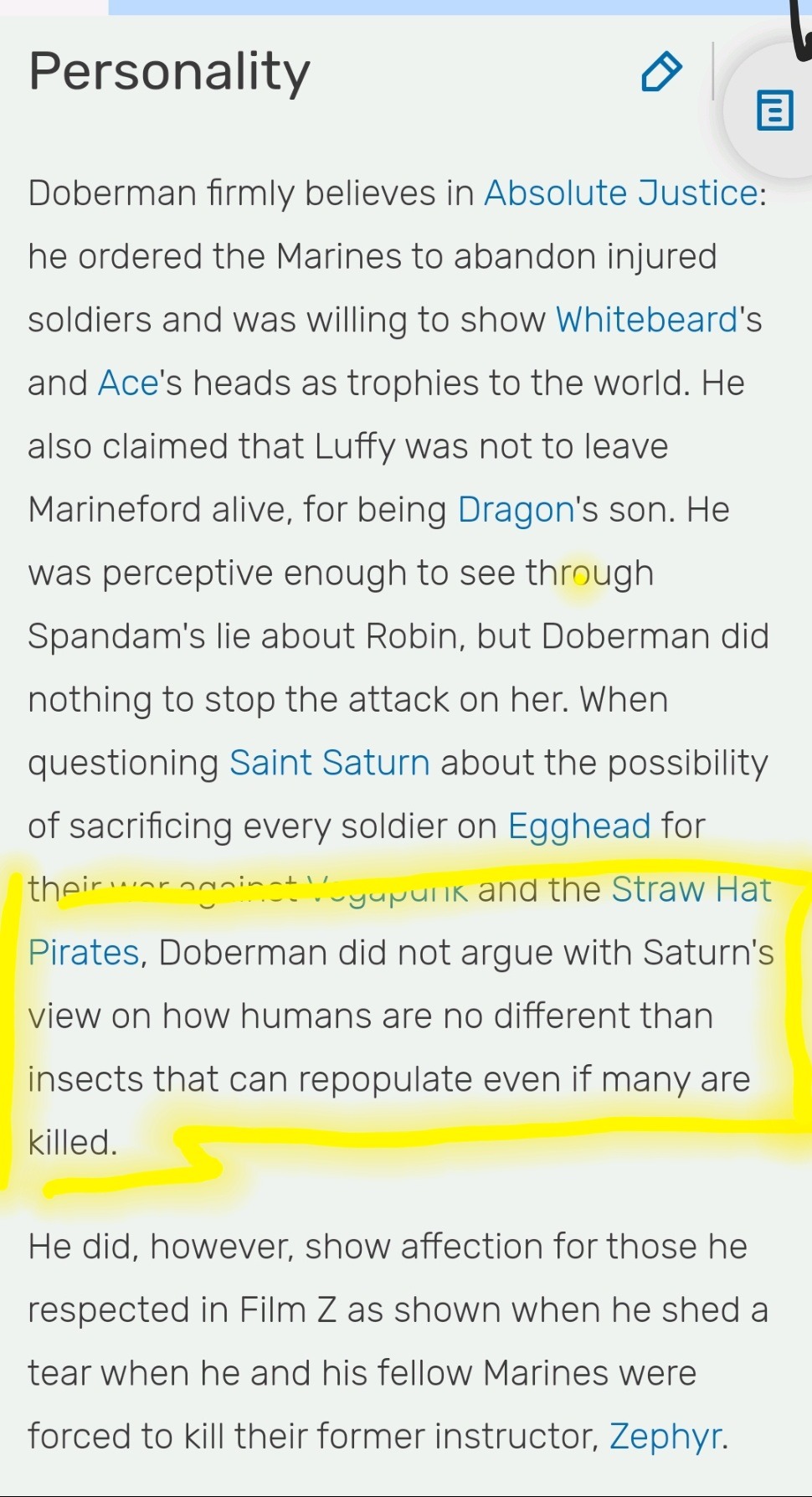
Its a gross misconception to think that Doberman does not mind Saint Saturn's statement "humans are insects"...which includes also the Marines that are fighting for the World government in the siege.
In fact if you look at the reaction panel Doberman is drawn with clear signs of distress ie. droplets of sweat, a prominent shadow beneath the Bill of his cap and closed eyes, both of them.
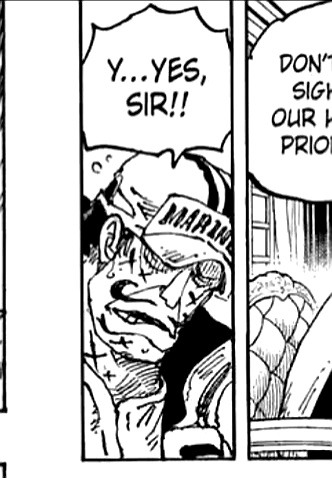
I say it again Doberman doesn't appear to agree with Saint Saturn's statement, however he is through and through a lawful pragmatic marine, rational, stoic, he cannot say anything because his rank is to low.. he is forced into silence.
Don't believe me let's recap Sakazuki snarling at the Gorosei for putting up misinformation in the newspaper about Doflamingo.
The Gorosei did not punish Sakazuki but WEREN'T pleased with Sakazuki and he is the fleet admiral at this point.
(The whole one piece fandom admired Sakazukis balls of steel that moment)
Doberman is a vice admiral if he speaks up against any plan or strategy that Saint Saturn suggests it could very well mean Dobermans death to do so and he understands that. Hence his hands are tied in this situation. That doesn't mean he is agreeing,but distressed ... Doberman is to rational as to risk his life for a personal belief.
Which brings me to this panel in chapter 1095,
After Saint Saturn is stabbed by Bonney the vice admirals are about to jump into action to defend him but Saturn yells at them to quit it and calls the Marines " quiet insects". And I bet that raises eyebrows with most Marines that are present at the siege.
My opinion is this will cause further unrest amongst the Marines when it comes to the Gorosei.
The five elder stars don't care not even for the soldiers that fight for them, if even Sakazuki is reprimanded firmly,
Its a great tragedy to see Marines being shuffled into various factions ie. Moral vs absolute justice, within their own institution not to mention being manhandled by the Gorosei in such a way, when it is obvious that not following orders get you executed, like in this siege.
BONUS LEVEL: ADMIRAL KIZARU
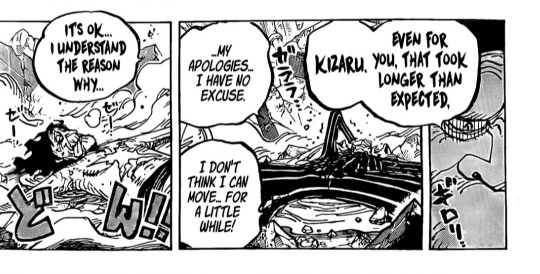
ok before I say anything else ... Oda did you draw Kizaru like this on purpose?? Wtf... that admiral is man spreading.. fan service ahoi
Ok naughty observation out of the way...
For real though out of all Marines, Kizaru is the only one Saint Saturn talks normal to, no direct insults no condescending language..if anything Saint Saturn sounds like a dissapointed parent.
I know that Kizaru is a sufficient and fast soldier obedient , no questions asked... but still... is that enough to Foster some respect from Saint Saturn...
My personal opinion there's more at play here. And my PERSONAL theory ok...my personal thoughts is that Kizaru is the illegitimate child of a rare or extinct family of Celestial dragons or of one of the Gorosei... there i said it... don't hate me but it would make sense to me.
13 notes
·
View notes
Text
Breaking the Silence: A Journey Towards Mental Health Awareness and SOS!
In the hush of our minds, sometimes there are storms. Hidden beneath smiles, laughter, and everyday conversations, there may lie a battlefield of emotions, struggles, and unseen wounds. Mental health, often whispered about in shadowy corners, is a topic that deserves the spotlight. It's time to break the silence and embark on a journey towards awareness and help.
Understanding the Landscape
Mental health encompasses our emotional, psychological, and social well-being. It affects how we think, feel, and act, shaping our interactions, relationships, and overall quality of life. Yet, despite its profound impact, mental health remains stigmatized and misunderstood in many communities.
Acknowledging the prevalence of mental health challenges is the first step towards fostering understanding and empathy. According to the World Health Organization (WHO), depression is the leading cause of disability worldwide, affecting over 264 million people. Anxiety disorders, bipolar disorder, schizophrenia, and other conditions also contribute to the complex tapestry of mental health experiences.
Breaking the Stigma
Stigma erects barriers, trapping individuals in a cycle of shame and silence. It perpetuates misconceptions, discrimination, and reluctance to seek help. However, education and open dialogue can dismantle these barriers, fostering an environment of acceptance and support.
By sharing personal stories, experiences, and insights, we chip away at the stigma surrounding mental health. Every conversation, every blog post, and every shared resource contributes to a collective effort to destigmatize mental illness and promote understanding.
Extending a Helping Hand
Recognizing the signs of mental distress and knowing how to offer support are crucial steps in promoting mental health awareness. Empathy, active listening, and validation create a safe space for individuals to express their feelings and seek assistance.
Moreover, access to mental health resources and services is paramount. From therapy and counseling to support groups and helplines, various avenues exist for individuals to receive the help they need. However, systemic barriers such as cost, availability, and cultural factors often impede access to care. Addressing these disparities requires advocacy, policy reform, and community outreach efforts.
The Power of Compassion and Connection
In our journey towards mental health awareness and help, compassion and connection serve as guiding beacons. They remind us that behind every statistic, diagnosis, and label lies a human being deserving of dignity, respect, and support.
As we navigate the complexities of mental health, let us extend kindness to ourselves and others. Let us listen without judgment, speak without fear, and reach out without hesitation. Together, we can break the silence, challenge stigma, and create a world where mental health is valued, understood, and prioritized.
In the tapestry of human experiences, mental health is an integral thread, woven into the fabric of our lives. By raising awareness, breaking stigma, and offering support, we nurture a culture of empathy, resilience, and hope. Let us continue our journey towards mental health awareness and help, one conversation, one blog post, and one act of kindness at a time.
3 notes
·
View notes
Text
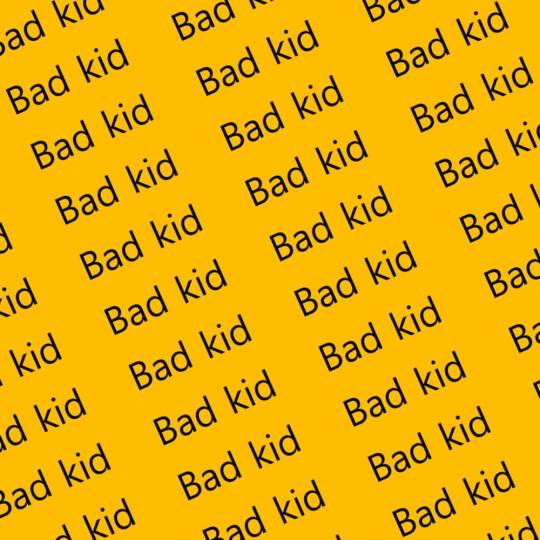
Foster children and former foster children frequently face harmful stereotypes, one of the most damaging being that they "lack empathy." This stereotype arises from misconceptions about the behaviors and emotional responses foster children develop as coping mechanisms due to their traumatic experiences. However, this stereotype is not only unfounded but also deeply ironic, as it often reflects a significant lack of empathy on the part of those who hold it.
Children enter the foster care system for various reasons, most of which involve severe trauma, such as abuse, neglect, or the loss of their family. These traumatic experiences can profoundly impact their emotional development and behavior. To survive in unstable and often harmful environments, many foster children develop defensive behaviors that can be misinterpreted as a lack of empathy. They might appear withdrawn, overly cautious, or unresponsive to others' emotions, not because they are inherently unempathic, but because they have learned to protect themselves from further emotional harm.
The real tragedy lies in how society often responds to these children. Instead of understanding and addressing the root causes of their behaviors, many people quickly label them as cold or unemotional. This labeling exacerbates the children's struggles, adding social stigma to their existing burdens. In fact, the very act of stereotyping foster children as lacking empathy highlights a glaring lack of empathy in the accusers. It shows an unwillingness to understand the complexities of trauma and an insensitivity to the children's lived experiences.
Empathy is not a static trait but a skill that can be nurtured and developed. Many foster children, when provided with stable, supportive, and understanding environments, can and do develop deep empathy. Their experiences often give them unique insights into suffering and resilience, which can make them extraordinarily compassionate and empathetic individuals. However, to reach this potential, they need the adults around them to show genuine empathy first.
Addressing this issue requires a societal shift in how we view and treat foster children. It demands training and educating foster parents, social workers, educators, and the community at large to recognize the signs of trauma and respond with compassion rather than judgment. It also calls for systemic changes in the foster care system to provide better mental health support, stability, and opportunities for foster children to heal and grow.
#foster kids#foster care#Stigma#Foster care stigma#Foster kid stereotypes#Emotion intelligence#EQ#Empathy#Trauma responses#Ptsd#Mental health#Trauma#childhood trauma#Foster teens
2 notes
·
View notes